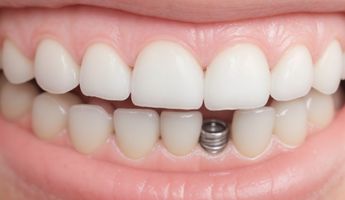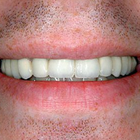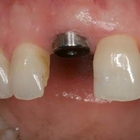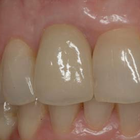Dental Implant in Mexico
Search and Compare the Best Clinics and Doctors at the Lowest Prices for Dental Implant in Mexico

Find the best clinics for Dental Implant in Mexico
With Medijump you can browse 74 facilities offering Dental Implant procedures in Mexico. The cheapest price available is $525 in Ciudad Juarez, Mexicali. And for the cheapest price globally, prices start from $1 in Vietnam.
Dental Implant in Ciudad Juarez
Price: $ 525
Dental Implant in Cancun
Price: $ 580
Vietnam offers the best prices Worldwide
Price: $ 1
From 4 verified reviews
Yurith Hinojos, 12 April 2019
They have an excellent work team. Highly recommended for any Dental treatment
From 18 verified reviews
Kelly beard, 17 September 2020
It was a breath of fresh air walking into Supreme Dental. Had been at another “clinic” earlier and it felt like an old folks cattle call; crowded and everyone was complaining about waiting for HOURS. Supreme Dental got me in at a moment’s notice. Office was clean; they do proper COVID-19 screening prior to entering their clinic. Much more like the dental offices in the US without the cost. The dentist told me what they could do and what they could not do because of the condition of my mouth. They didn’t just agree to do anything I wanted for the money if they didn’t feel it would be successful. I was able to see their periodontist at short notice. I’m still considering what to do, but feel great to have found Supreme Dental.
From 12 verified reviews
Lori Mulvey, 24 April 2020
Best dentist I have ever had! Highly recommend. Entire team was excellent.
From 3 verified reviews
Carlos Lara, 16 September 2019
Personalized attention, treatment follow-up and availability if an emergency arises, 10 months of treatment and everything goes excellent.
From 5 verified reviews
José Carlos Alva, 21 September 2019
Very good service, excelente dental treatment.The doctors are very kind and helpful
From 6 verified reviews
MJ Reyes, 06 January 2020
Dr. Velasco was the doctor of my family for over 10 years and serves you with kindness and respect. Thanks to him my family has been healed of many diseases. Thanks Dr. Velasco.
From 5 verified reviews
Aymara B. Manson, 16 September 2019
Excellent service, and professional moi.
From 5 verified reviews
Aymara B. Manson, 22 August 2019
Excellent service, and professional moi.
Clinica Integral Rubio, can be found in Calle Tercera, Los Algodones, Mexico and offers its patients Dental Implant procedures as well as 36 other procedures, across 2 different procedure categories. At present, there is no pricing information for Dental Implant procedures at Clinica Integral Rubio. The pricing information is quite specialised, so it's only available on request, and the average price is around $781. A small team of medical professionals undertake all procedures at the Hospital, with 3 in total, and Clinica Integral Rubio has several accreditations, including: ITI - International Team for ImplantologyICOI - International Congress of Oral ImplantologistsADM - Mexican Dental AssociationAAID - American Academy of Implant DentistryAMP - Mexican Association of Periodontology
Clinica Medica and Dental de Tijuana, located in Diego Rivera, Tijuana, Mexico offers patients Dental Implant procedures among its total of 66 available procedures, across 4 different specialties. Currently, there's no pricing information for Dental Implant procedures at Clinica Medica and Dental de Tijuana, as all prices are available on request only, whilst the national average price is approximately $781. All procedures and treatments are undertaken by just a small team of specialists, with 2 in total at the Dental, and they are not accredited by any recognized accreditations institutes
Dental del Rio, can be found in Calle Tercera, Los Algodones, Mexico and offers its patients Dental Implant procedures as well as 55 other procedures, across 2 different procedure categories. The price of a Dental Implant procedure starts from just ฿23,700, and the average price is around ฿28,101. Many medical professionals work at the Dental, with 8 in total, and Dental del Rio is not accredited by any recognised accreditations institutions.
Perio-Implant Clinic, can be found in Calle Ecuador, Monterrey, Mexico and offers its patients Dental Implant procedures as well as 41 other procedures, across 2 different procedure categories. The price of a Dental Implant procedure starts from just ฿25,900, and the average price is around ฿28,101. The lead specialist at the Clinic will be carrying out all the treatments, and Perio-Implant Clinic is not accredited by any recognised accreditations institutions.
My Dental Brush Mexicali, located in Cto Brasil, Mexicali, Mexico offers patients Dental Implant procedures among its total of 55 available procedures, across 2 different specialties. The cost of a Dental Implant procedure starts from ฿26,900, whilst the national average price is approximately ฿28,101. All procedures and treatments are undertaken by just a small team of specialists, with 3 in total at the Dental, and they are accredited by American Dental Association
Tijuana Dental Wellness, located in Diego Rivera, Tijuana, Mexico offers patients Dental Implant procedures among its total of 56 available procedures, across 2 different specialties. The cost of a Dental Implant procedure starts from $1,053, whilst the national average price is approximately $781. There are many specialists available at the Dental, with 8 in total, and they are not accredited by any recognized accreditations institutes
Kool Dental, can be found in Calle Tercera, Los Algodones, Mexico and offers its patients Dental Implant procedures as well as 11 other procedures, across 1 different procedure categories. The price of a Dental Implant procedure varies from $1,000 to $1,150, and the average price is around $781. A small team of medical professionals undertake all procedures at the Clinic, with 2 in total, and Kool Dental is not accredited by any recognised accreditations institutions.
Cancun Dental Design, can be found in Blvd Kukulcan, Cancun, Mexico and offers its patients Dental Implant procedures as well as 12 other procedures, across 2 different procedure categories. The price of a Dental Implant procedure varies from $580 to $14,600, and the average price is around $781. Many medical professionals work at the Dental, with 10 in total, and Cancun Dental Design is not accredited by any recognised accreditations institutions.
Advanced Cabo Dentistry, can be found in Zapopan, Jalisco, Mexico and offers its patients Dental Implant procedures as well as 18 other procedures, across 1 different procedure categories. The price of a Dental Implant procedure varies from $900 to $6,400, and the average price is around $781. A small team of medical professionals undertake all procedures at the Dental, with 2 in total, and Advanced Cabo Dentistry is not accredited by any recognised accreditations institutions.
Dr. Alex Ulloa, can be found in Calle Tercera, Los Algodones, Mexico and offers its patients Dental Implant procedures as well as 9 other procedures, across 2 different procedure categories. The price of a Dental Implant procedure varies from $750 to $1,200, and the average price is around $781. A small team of medical professionals undertake all procedures at the Dental, with 2 in total, and Dr. Alex Ulloa has several accreditations, including: American Dental AssociationADM - Mexican Dental Association
Point Dental, can be found in Calle Tercera, Los Algodones, Mexico and offers its patients Dental Implant procedures as well as 14 other procedures, across 1 different procedure categories. The price of a Dental Implant procedure varies from $700 to $750, and the average price is around $781. A small team of medical professionals undertake all procedures at the Dental, with 3 in total, and Point Dental is not accredited by any recognised accreditations institutions.
Dental del Rio Algodones, can be found in Calle Tercera, Los Algodones, Mexico and offers its patients Dental Implant procedures as well as 11 other procedures, across 1 different procedure categories. The price of a Dental Implant procedure varies from $750 to $900, and the average price is around $781. Many medical professionals work at the Dental, with 8 in total, and Dental del Rio Algodones has several accreditations, including: American Dental AssociationADM - Mexican Dental Association
- Home
- Mexico
Compare Before & After Photos of _procedure_photos.phpDental Implant


Front view


Front view


Front view


Front view


Front view
WHY US?
At Medijump, we're making medical easy. You can search, compare, discuss, and book your medical all in one place. We open the door to the best medical providers worldwide, saving you time and energy along the way, and it's all for FREE, no hidden fees, and no price markups guaranteed. So what are you waiting for?

Free

Best Price

Widest Selection

Risk-Free
What you need to know about Dental Implant in Mexico

A dental implant is a medical device that provide support to artificial teeth. It's surgically placed into the jaw to act as a replacement for the root of a missing or damaged tooth, which in turn serves to hold a replacement tooth or bridge. It functions and looks much like a real tooth, restoring your ability to chew and improves your overall appearance. Dental implant surgery is considered as a better alternative to dentures or bridgework that does not fit well. It also offers a great option for people when they do not have enough natural teeth roots left to build denture or bridgework replacements.
Since dental implants eventually fuse with your jawbone over the span of several months, it won’t make noise, slip, or cause bone damage the way dentures or bridgework might. Dental implants also enable natural speech, look and feel like your own teeth, make eating easier, and improves your appearance. However, the surgery may involve several stages, and, in some cases, it may require two separate visits to the clinic to complete. Ensure to look for a specialist in a reputable clinic for the best results.
What is the cost of Dental Implant in Mexico?
Price differences abound in Mexico for Dental Implant based on the clinic, the proficiency of the surgeon, and the individual requirements of the patients. It's essential to realize that dental insurance usually doesn't cover the entire bill for this treatment, though it might cover a part. Several dental clinics provide finance schemes or payment alternatives to assist in easing the financial burden. For more precise cost estimates, reach out to your dental service provider or a nearby clinic.
What does a Dental Implant Procedure Involve?
Dental implant surgery generally requires several stages. Each stage may be performed under general or local anesthetic. The first stage is removing the damaged tooth. Then, if your jawbone is too soft or not thick enough, your dentist may perform bone grafting to create a more solid base for the implant. The bone graft may be natural (taken from another part of your body) or synthetic (a bone-substitute material). If you only need minor bone grafting, the implant surgery can be performed on the same day. However, if you need a significant amount of bone graft, the implant surgery may have to be postponed until the transplanted bone grows enough new bone to support the dental implant.
The next stage after the damaged tooth removal and bone graft (if you need one) is placing the dental implant. To do this, your dentist makes an incision to expose the bone and puts the metal implant post deep into the bone. At this stage, you will still have a gap where your tooth is missing. Your dentist will place a temporary denture for appearance. Once the metal implant post is placed, osseointegration begins. This is a process where the jawbone grows into the surface of the implant and can take several months to complete. After osseointegration is complete, your dentist will place the abutment, which is a small connector post that will hold your new tooth. The final stage, after the abutment is placed, is placing the crown, which is the tooth-looking part. You can choose between a removable crown and a fixed crown.
How Long Should I Stay in Mexico for a Dental Implant Procedure?
The length of your stay in Mexico for a Dental Implant depends on numerous considerations like the intricacies of the procedure, the quantity of implants required, and your personal recovery process. Each stage of dental implant surgery is done in separate appointments. After each appointment, you should be able to leave the hospital or clinic right away. However, you should stay in Mexico for at least 2 weeks for completion of the work, the initial recovery time, and follow-up checkups.
What's the Recovery Time for Dental Implant Procedures?
The recuperation duration following a Dental Implant or dental implant operation can widely vary and is shaped by multiple aspects. Initial healing of the tissue might require only a handful of days, but complete osseointegration (the fusion of the implant with the jawbone) generally spans several months. This window could be extended for patients requiring auxiliary procedures such as bone grafts, or those with prevailing health issues that may impede the healing process.
Post-procedure, it's not unusual to experience a degree of discomfort, which could manifest as minor pain, swelling of your gums and face, skin and gum bruising, and slight bleeding. Such symptoms are a standard phase of the recovery process and should alleviate within a fortnight. In this interim, it's advisable to stick to a soft diet to not overload the implant site with undue pressure. Any strenuous physical exertion should be put off to circumvent potential complications.
Maintaining excellent oral hygiene is paramount to facilitate healing and stave off infection. Regular brushing and flossing, being particularly gentle around the surgical area, coupled with rinsing your oral cavity with warm saline water, can contribute to keeping the region hygienic.
What sort of Aftercare is Required for Dental Implant Procedures?
After each stage of surgery, you may have to eat soft foods. Since you may experience swelling, bruising, pain, and minor bleeding, your dentist will prescribe pain medications or antibiotics to help ease your discomfort. During your recovery period, you need to avoid smoking as it can contribute to implant failure and complications.
No special care is required for dental implants. Nonetheless, you need to practice good oral hygiene in order to maintain the implant and your remaining natural teeth. Make sure to brush your teeth twice a day, floss daily, and rinse your mouth with an antiseptic mouthwash. You also need to see your dentist regularly and avoid damaging habits, such as chewing hard items.
What's the Success Rate of Dental Implant Procedures?
The efficacy of Dental Implant, alternatively referred to as dental implants, in Mexico, is typically impressive, boasting effectiveness percentages as high as 98% in some studies. This positions dental implants as one of the most reliable procedures within dental care's realm. Nevertheless, it's worth mentioning that the success rates might fluctuate, influenced by several factors.
The patient's overall health is a key determinant of the thriving outcome of a dental implant procedure. Individuals exhibiting optimal health usually witness higher success rates. Pre-existing health issues like diabetes, osteoporosis, and periodontal ailments can theoretically impact the efficacy of the implant.
Additional contributing factors to the success rate encompass the quality and abundance of the individual's bone structure. Patients boasting plentiful, healthy bone are ordinarily the perfect candidates for dental implants. However, those who have experienced bone loss might need to undergo a bone grafting procedure before the implant procedure. This step can provide a robust base for the implant and enhance the chances of a successful result.
Are there Alternatives to Dental Implant Procedures?
If you are not a candidate for dental implant surgery, or you simply do not want to undergo the procedure, you can opt for the alternatives. The alternatives include:
- Mini dental implants, which is a small type of dental implants. The structure is similar to regular dental implants, but are somewhat smaller in size. Unlike regular dental implants, dentists can often place mini implants only in one visit using local anesthesia. You may also be able to use your new teeth on the same day.
- A same-day implant is essentially similar to traditional dental implants. However, your dentist performs the whole process in just one day, skipping the process of wound healing and osseointegration.
- Implant-supported dentures or All-on-4 is an alternative if you need to fix a complete upper or lower set of teeth. During this procedure, four to six implants are placed into your jawbone as a base to attach and stabilize your denture.
What Should You Expect Before and After the Dental Implant Procedure?
Grasping what lies ahead before and post the Dental Implant can lessen potential worries and guarantee you are fully equipped for the upcoming journey. Prior to the procedure, your dental practitioner will conduct an all-inclusive dental assessment. This check-up may encompass dental X-rays and sophisticated 3D imaging to examine the status of your oral cavity.
The dental professional will also explore your medical history. If you're suffering from specific heart disorders or orthopedic implants, your dental practitioner might suggest antibiotics to avert infection. A personalized treatment blueprint, customized to your circumstances, will be constructed. This strategy takes into account factors like the amount of teeth you need substituted and the state of your jawbone. The procedure is typically carried out under local anesthesia to mitigate any discomfort.
Subsequent to the operation, experiencing slight unease is usual. You might witness inflammation of your face and gums, discoloration of your skin and gums, soreness at the insertion area, and insignificant bleeding. Your dental specialist will recommend medications to soothe these indicators. In case inflation, unease, or any other complications intensify in the days post-operation, it's crucial to reach out to your oral surgeon. Post-operation will require you to consume mushy foods as the operated site recovers. Moreover, you'll be guided to abstain from smoking, as it can hinder recovery and influence the triumph of the dental implant.
Following the positioning of the implant, the healing process, and fusion with the bone (osseointegration) transpire over an extended period. During this interval, maintaining robust oral cleanliness is vital. This involves frequent brushing, the use of dental floss, and cleansing with an antibacterial mouthwash. Periodic dental examinations are obligatory to track progress and confirm the well-being and effectiveness of the implant.
What are Potential Risks of Dental Implant?
Despite Dental Implant boasting remarkable effectiveness, it is, as any surgical operation, not without risks and potential difficulties. The chances of encountering these issues are often minute and irregularities are infrequent, yet it remains critical for patients to comprehend these possibilities before undertaking the procedure.
Complications and side effects may include:
- Implant failure
- Nerve injury
- Infection
- Sinus problems
- Damage to surrounding structures, such as other teeth or blood vessels
How long does a Dental Implant last?
The durability of a Dental Implant is heavily reliant on the individual's oral cleanliness and general wellbeing. Nonetheless, with appropriate upkeep and care, dental implants have the potential to stand the test of time. The titanium pillar inserted into the jawbone during surgery is crafted to be everlasting, while the dental cap fastened to the anchor may necessitate substitution every decade or decade and a half due to normal usage. Yet, with outstanding dental management and habitual screenings, the cap has the potential for lifelong endurance.
Whilst the information presented here has been accurately sourced and verified by a medical professional for its accuracy, it is still advised to consult with your doctor before pursuing a medical treatment at one of the listed medical providers
No Time?
Tell us what you're looking for and we'll reachout to the top clinics all at once
Enquire Now

Popular Procedures in Mexico
Prices Start From $1

Prices Start From $1

Prices Start From $48

Prices Start From $1

Prices Start From $1

Prices Start From $11

Prices Start From $1

Prices Start From $45

Recommended Medical Centers in Mexico for Dental Implant

- Interpreter services
- Translation service
- Religious facilities
- Medical records transfer
- Medical travel insurance
- Health insurance coordination
- TV in the room
- Safe in the room
- Phone in the room
- Private rooms for patients available

- Interpreter services
- Translation service
- Religious facilities
- Medical records transfer
- Medical travel insurance
- Health insurance coordination
- TV in the room
- Safe in the room
- Phone in the room
- Private rooms for patients available

- Interpreter services
- Translation service
- Religious facilities
- Medical records transfer
- Medical travel insurance
- Health insurance coordination
- TV in the room
- Safe in the room
- Phone in the room
- Private rooms for patients available

- Interpreter services
- Translation service
- Religious facilities
- Medical records transfer
- Medical travel insurance
- Health insurance coordination
- TV in the room
- Safe in the room
- Phone in the room
- Private rooms for patients available

- Interpreter services
- Translation service
- Religious facilities
- Medical records transfer
- Medical travel insurance
- Health insurance coordination
- TV in the room
- Safe in the room
- Phone in the room
- Private rooms for patients available

- Interpreter services
- Translation service
- Religious facilities
- Medical records transfer
- Medical travel insurance
- Health insurance coordination
- TV in the room
- Safe in the room
- Phone in the room
- Private rooms for patients available

- Interpreter services
- Translation service
- Religious facilities
- Medical records transfer
- Medical travel insurance
- Health insurance coordination
- TV in the room
- Safe in the room
- Phone in the room
- Private rooms for patients available

- Interpreter services
- Translation service
- Religious facilities
- Medical records transfer
- Medical travel insurance
- Health insurance coordination
- TV in the room
- Safe in the room
- Phone in the room
- Private rooms for patients available

- Interpreter services
- Translation service
- Religious facilities
- Medical records transfer
- Medical travel insurance
- Health insurance coordination
- TV in the room
- Safe in the room
- Phone in the room
- Private rooms for patients available

- Interpreter services
- Translation service
- Religious facilities
- Medical records transfer
- Medical travel insurance
- Health insurance coordination
- TV in the room
- Safe in the room
- Phone in the room
- Private rooms for patients available
Dental Implant in and around Mexico
About Mexico
The Country of Mexico forms a part of the North American continent and lies directly south of the United States and is the fifth largest country in the Americas. It comprises 31 states and a Federal District. The capital of Mexico City lies in the Federal District. Mexico is dominated by several mountain ranges and the more well-known ones are the Sierra Madre Oriental and the Sierra Madre Occidental. It is famous for its amazing beaches, and the best-known Latin American pyramids include the Pyramid of the Sun and the Pyramid of the Moon at Teotihuacán in central Mexico,
Mexico ranks among the top five locales for medical tourism worldwide, consistently attracting those seeking not only medical care but luxurious, boutique-styled facilities for recovery as well. The distinct appeal to choosing Mexico as a destination for medical procedures is not solely based on the accommodation standards, but also the notably lower costs contrasted with those in the United States. With a price tag that usually amounts to 70-80% less than what you'd expect to pay in the US for the same procedure, it's no wonder why Mexico is such an attractive option for medical tourists.
In terms of the economic value, medical tourism in Mexico has proven to be no small industry. According to the data gathered in 2016, the industry is worth a whopping $4.8 Billion. Moreover, it is not an underused resource, as can be seen in the influx of medical tourists that the country welcomes each year. An astonishing 1 million individuals travel to Mexico annually, seeking different varieties of treatments and procedures.
Geographically, it's noted that the majority of these medical tourists hail from nearby US states. In fact, states that border Mexico, such as California, Texas, and Arizona, make up approximately 70% of the medical tourists that arrive in Mexico.
Tijuana, Cancun, Mexicali, and Monterrey are some of the more popular cities in Mexico for medical tourism and the flowing procedures:
- Dental treatments including dental surgery
- Plastic and Cosmetic Surgery
- Bariatric Surgery
- Other medical procedures like dermatology, orthopedics, gynecology, and ophthalmology.
Popular Parts of Mexico
Six Cities in Mexico that should be on your itinerary:
- Mexico City – This enormous capital city is the most populous city on the North American continent. The metropolitan area of the city is home to a staggering 21.2 million people. El Zocalo, the main public square is a famous landmark in Mexico City. It is also a UNESCO World Heritage site.
- Cancun –Is a major resort city with turquoise blue waters and striking white sandy beaches. It has a population of about 628,000 people. You can take day trips to the Mayan ruins, the unspoiled jungle habitats of Coba, and Chichen Itza from Cancun.
- San Miguel de Allende –Is one of the most popular cities in Mexico. The must-visit sites in this city are the San Miguel Arcangel Parish, the archaeological zone of Canada la Virgen, and the handicraft market.
- Guadalajara – It’s the second largest city in Mexico and has a population of 5.1 million. The city has a more relaxed feel and a distinctly Mexican flavor. The historic center is impressive with a cathedral and colonial architecture. Guadalajara Cathedral, Instituto Cultural de Cabanas, and the Expiatory Temple are famous sights to visit.
- Oaxaca – Is a southern Mexican city and is situated in a valley. It is home to 4.2 million inhabitants. Oaxaca Cathedral, Zocalo and Mercado Benito Juarez, and The Rufino Tamayo Museum are a few of the interesting places to see in this city.
- Tijuana – Is a border city in Mexico and shares its border with California. Because of its location, this city is very popular with American medical tourists. The Avenida Revolucion is the main street and is lined with Bars and Restaurants. Popular landmarks include Jai Alai Fronton Palace, Centro Cultural Tijuana, and Estadio Caliente. It has a population of 1.3 million people.
Other important cities are Merida, Acapulco, Puebla City, Taxco Puerto Vallarto, and Playa del Carmen.
Weather and Climate in Mexico
Mexico, in its vastness, doesn't possess a uniform climate throughout the nation. Various regions exhibit distinct weather patterns, which are inextricably linked to their geographical features. Given Mexico's immense size, it's unsurprising that the climate varies significantly across different locations. The periodic patterns across the nation are not homogenous, as one would expect in a smaller, less diverse country. Instead, Mexico’s topography, which is incredibly varied, heavily influences the country’s diverse weather and climate.
In terms of seasonality, Mexico traditionally experiences two major seasons - the rainy season and the dry season. Each of these seasons presents its own unique set of conditions and weather patterns, shaping the climate across the country in distinctive ways. The shifts between these periods of rain and periods of drought are quite pronounced, showcasing the climatic dualism that shapes the Mexican landscape. This cyclical pattern of rainy and dry seasons is a key part of Mexico's climatic identity, having profound effects on both its environment and the livelihood of its inhabitants.
- Rainy Season – Most of Mexico experiences rain from May to September or October. The weather is hot and humid in these months, especially in Southern Mexico. The average temperature in the summer months is around 83 degrees Fahrenheit. In winter, the temperature averages between 68- and 74 degrees Fahrenheit.
- Dry Season – October to May there is hardly any rain and it happens to be the most popular time to visit Mexico. During the winter months of December to February, the non-coastal regions have cold weather. At times, it reaches freezing temperatures. June to November is the hurricane season and hence it is better to avoid traveling during this time.
Getting Around in Mexico
The easiest way to reach Mexico is through Mexico City International Airport, which is also referred to as Benito Juarez International Airport, which is the busiest airport in Mexico. The airport links 52 domestic cities and 50 international destinations in Latin America, North America, Europe, and Asia. Aeromexico is the largest carrier serving many Latin American cities, domestic and international cities. Other prominent Mexican airlines are Interjet, Volaris, and Aeromar. Major American carriers like United Airlines, American Airlines, and Delta Air also operate flights to Mexico City.
For travel within Mexico, air travel is the best mode considering the vast size of the country. Budget airlines like Avolar, Azteca, Interjet, vivaAerobus, and Volaris offer competitive and cheap airfares for domestic travel.
You can navigate between cities via local buses and rental cars, making the journey a part of your Mexican adventure. However, for a quicker commute, the metro system prevails as the fastest mode of transport. This web of fast trains bridges the gap between major cities including Mexico City, Guadalajara and Monterrey, ensuring convenient and expedient transportation.
Navigating through Mexico City is fairly simple and cost-effective, courtesy of its inexpensive public transport system. You can choose from a variety of transport modes, including the Metro, first and second-class buses, colectivos, and Nissan Tsuru libre taxis.
However, if you prefer sitio taxis, it is advised not to hail one from the street after dark for safety reasons. Furthermore, for those not fluent in Spanish or unfamiliar with the city's layout, it is highly recommended to use taxis from Taxi Ranks, ensuring a smoother and more secure journey.
Tourist Visas in Mexico
Traveling to Mexico as a tourist, you need to apply for and get a tourist visa well in advance. Your passport must be valid to cover at least three months beyond the duration of your visa. A Mexican tourist visa is for a single entry and is valid for only six months. You should travel within 90 days of the visa being issued.
Mexico has a waiver for the tourist visa requirement for the citizens of 67 countries including the USA, European Union, Latin America, and Australia. Under this privilege, you can visit Mexico for a period of 30 to 180 days without a tourist visa. However, you need to get an online Electronic Authorization before traveling to Mexico.
Nationals of Russia, India China and a few other countries need to get a visa in advance before entering Mexico.
Additional Information
- The currency of Mexico is Peso and has a $ symbol like the US Dollar. So, MXN is an alternative symbol to avoid confusion. Shopkeepers accept US dollars but refuse Euros. The conversion rate of a US dollar to Mexican Peso is 17.97 as of Mexico 2023.
- You can use debit and credit cards within city limits in Mexico, but many retailers levy a surcharge for credit cards. Small shopkeepers insist on cash. ATMs are present everywhere and have bilingual options with English as a choice.
- Spanish is the first and the main language spoken in Mexico. People also speak English in tourist areas and along the Northern border. However, it is always better to learn a little Spanish when you travel to Mexico.
- Mexico does not have a national religion, but Roman Catholicism is a major faith.
- Constitution Day (Feb 4), Benito Juarez’s Birthday (Mar 18), Independence Day (Sep 16), Revolution Day (Nov 18), and Christmas (Dec 25) are some of the statutory public holidays in Mexico.
Popular Searches
- Plastic Surgery in Thailand
- Dental Implants in Thailand
- Hair Transplant in Thailand
- Breast Augmentation Thailand
- Gastric Sleeve in Thailand
- Gender Reassignment Surgery in Thailand
- Laser Hair Removal in Bangkok
- Botox in Bangkok
- Dermatology in Bangkok
- Breast Augmentation in Bangkok
- Coolsculpting in Bangkok
- Veneers in Turkey
- Hair Transplant in Turkey
- Rhinoplasty in Turkey
- Stem Cell Therapy in Mexico
- Rhinoplasty in Mexico
- Liposuction in Mexico
- Coolsculpting in Tijuana
- Rhinoplasty in Korea
- Scar Removal in Korea
- Gastric Sleeve in Turkey
- Bone Marrow Transplant in India
- Invisalign in Malaysia
- Plastic Surgery in the Dominican Republic
- Tummy Tuck in the Dominican Republic
- Plastic and Cosmetic Surgery in Poland
- Rhinoplasty in Poland
- Hair Implant in Poland
- Dental Implants in Poland
- IVF in Turkey



















